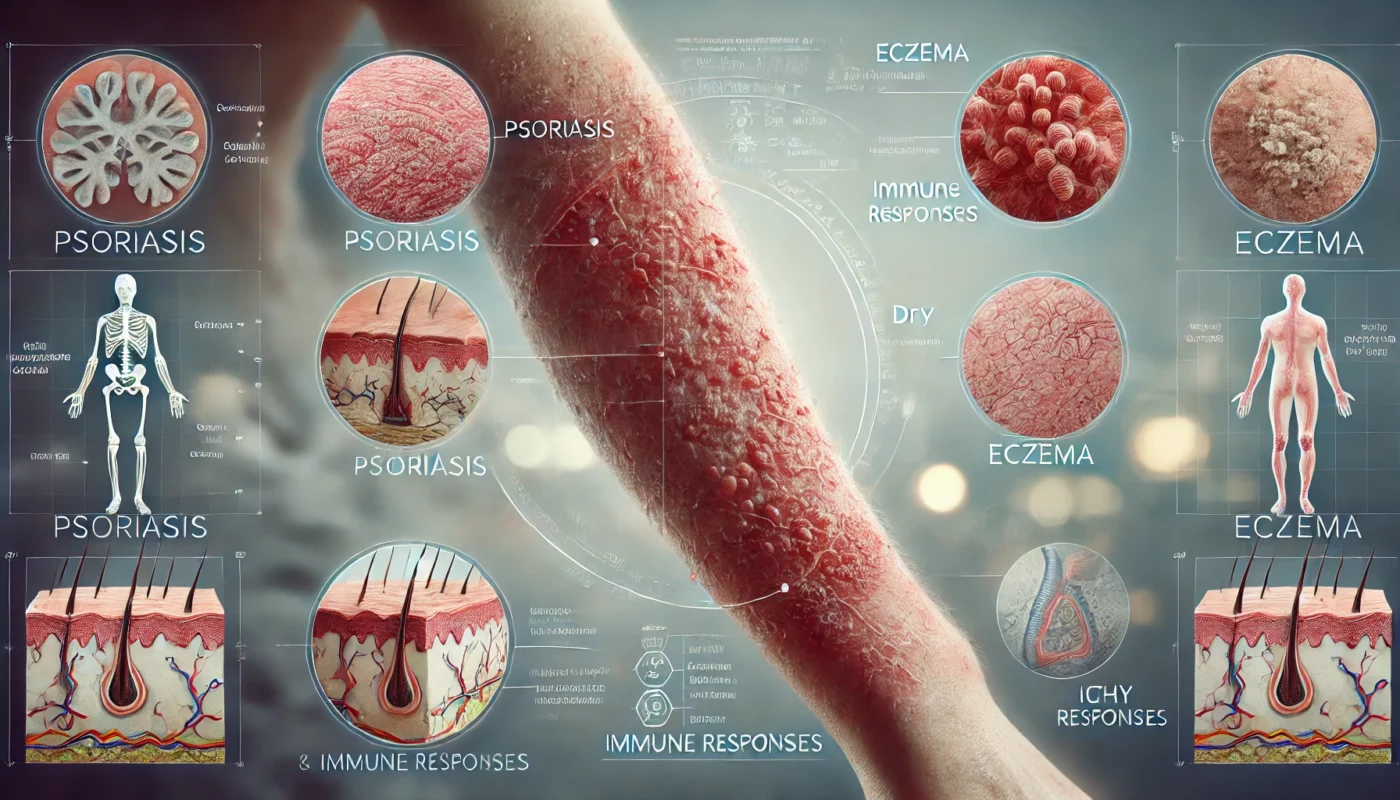Chronic inflammatory skin diseases, such as eczema (atopic dermatitis) and psoriasis, affect millions of people worldwide, often leading to discomfort, pain, and psychological stress. These conditions are characterized by persistent inflammation, disruption of the skin barrier, and immune system dysregulation. While topical treatments and systemic medications are widely used, there is growing interest in the role of nutrition and supplementation in managing these conditions.
Zinc, an essential trace mineral, plays a crucial role in skin health, immune function, and inflammation control. Zinc picolinate, a highly bioavailable form of zinc, has shown promise in reducing the severity of chronic inflammatory skin conditions. This article explores the science behind zinc picolinate’s role in managing eczema, psoriasis, and other inflammatory skin diseases, backed by clinical studies and evidence-based findings.
You May Also Like:
Zinc Picolinate and Skin Barrier Function: The Science You Need to Know
Zinc Picolinate for Glowing Skin: A Natural Boost for Complexion
Understanding Chronic Inflammatory Skin Diseases
Eczema (Atopic Dermatitis)
Eczema is a chronic condition characterized by red, itchy, and inflamed skin. It results from a combination of genetic, environmental, and immune system factors.
- Prevalence: According to the National Eczema Association, approximately 10% of the U.S. population suffers from eczema.
- Causes: Skin barrier dysfunction, immune dysregulation, and environmental triggers (e.g., allergens, irritants).
Psoriasis
Psoriasis is an autoimmune disease that accelerates skin cell turnover, leading to thick, scaly patches of skin. It is often accompanied by systemic inflammation.
- Prevalence: The World Psoriasis Day consortium estimates that 2–3% of the global population has psoriasis.
- Causes: Genetic predisposition, immune system overactivity, and environmental factors.
Both conditions are linked to chronic inflammation and oxidative stress, making zinc an essential nutrient in their management.

The Role of Zinc in Skin Health
Zinc is integral to maintaining skin integrity, regulating immune responses, and reducing inflammation. Its key roles include:
- Anti-Inflammatory Effects:
Zinc modulates the production of inflammatory cytokines, reducing redness, swelling, and irritation. - Skin Barrier Repair:
Zinc supports the production of proteins and lipids essential for maintaining a healthy skin barrier. - Wound Healing:
Zinc promotes cellular repair and regeneration, accelerating the healing of inflamed or damaged skin. - Immune Regulation:
Zinc helps balance immune activity, reducing autoimmune responses and hypersensitivity. - Antioxidant Protection:
Zinc enhances the activity of antioxidant enzymes, protecting skin cells from oxidative damage caused by inflammation.
What Is Zinc Picolinate?
Zinc picolinate is a chelated form of zinc, where zinc is bound to picolinic acid. This structure enhances zinc absorption in the gastrointestinal tract, making it one of the most bioavailable forms of zinc supplementation. For individuals with chronic inflammatory skin diseases, zinc picolinate ensures efficient delivery of zinc to the skin and immune cells.

How Zinc Picolinate Benefits Inflammatory Skin Diseases
1. Reducing Inflammatory Cytokines
Inflammatory skin conditions like eczema and psoriasis involve elevated levels of cytokines such as interleukin-6 (IL-6) and tumor necrosis factor-alpha (TNF-α). Zinc picolinate reduces these pro-inflammatory molecules, alleviating symptoms.
- Study Insight: A study in Nutrients showed that zinc supplementation reduced IL-6 and TNF-α levels by 20–30%, improving skin inflammation in psoriasis patients.
2. Enhancing Skin Barrier Function
The skin barrier is often compromised in eczema and psoriasis, leading to increased water loss and susceptibility to irritants. Zinc picolinate promotes the production of ceramides and proteins that strengthen the skin barrier.
- Clinical Evidence: Research in Journal of Investigative Dermatology found that zinc supplementation improved skin barrier integrity by 18%, reducing dryness and irritation in eczema patients.
3. Supporting Wound Healing and Tissue Repair
Inflamed or damaged skin in eczema and psoriasis requires efficient repair mechanisms. Zinc picolinate accelerates wound healing by promoting fibroblast activity and collagen synthesis.
- Research Finding: A study in Wound Repair and Regeneration reported that zinc supplementation reduced wound healing time by 25% in individuals with chronic skin inflammation.
4. Regulating Immune Activity
Psoriasis is driven by an overactive immune system. Zinc picolinate modulates T-cell function, reducing the autoimmune response that exacerbates the condition.
- Evidence: A clinical trial in Immunology and Cell Biology showed that zinc improved regulatory T-cell activity by 15%, helping to control psoriasis symptoms.
5. Combating Oxidative Stress
Inflammatory skin diseases generate excessive free radicals, damaging skin cells and worsening inflammation. Zinc picolinate enhances antioxidant defenses, protecting the skin from oxidative damage.
- Study Insight: Research in Free Radical Biology and Medicine demonstrated that zinc increased antioxidant enzyme activity by 35%, reducing oxidative stress in psoriasis patients.

Zinc Deficiency and Skin Inflammation
Zinc deficiency is common in individuals with eczema and psoriasis and can worsen symptoms by impairing skin repair and immune function.
Symptoms of Zinc Deficiency:
- Dry, flaky skin
- Slow wound healing
- Increased susceptibility to infections
- Persistent inflammation
Statistics:
- A study in The Lancet found that 15–20% of individuals with chronic inflammatory skin diseases have suboptimal zinc levels.
Dietary Sources of Zinc
While zinc picolinate supplementation is effective, incorporating zinc-rich foods into the diet can support skin health. Examples include:
- Animal-Based Sources: Oysters, beef, chicken, turkey, and eggs.
- Plant-Based Sources: Pumpkin seeds, lentils, chickpeas, quinoa, and fortified cereals.
For individuals with dietary restrictions or increased zinc needs, zinc picolinate offers a reliable and bioavailable alternative.

Recommended Dosage and Safety
The recommended dietary allowance (RDA) for zinc is:
- Men: 11 mg/day
- Women: 8 mg/day
For managing eczema and psoriasis, therapeutic doses of zinc picolinate typically range from 15–30 mg/day. Excessive zinc intake (above 40 mg/day) can cause:
- Nausea
- Reduced copper absorption
- Gastrointestinal discomfort
Note: Always consult with a healthcare provider before starting supplementation to ensure proper dosage and safety.
Integrating Zinc Picolinate into a Skin Health Routine
- Combine with Topical Treatments: Pair zinc picolinate supplementation with topical creams containing zinc oxide for targeted relief.
- Adopt an Anti-Inflammatory Diet: Include foods rich in omega-3 fatty acids, antioxidants, and zinc to complement supplementation.
- Monitor Skin Symptoms: Track changes in redness, scaling, and itchiness after starting supplementation.
- Stay Hydrated: Proper hydration supports skin barrier function and reduces dryness.
Who Can Benefit from Zinc Picolinate for Skin Health?
- Individuals with Eczema: Zinc picolinate reduces itchiness, inflammation, and dryness.
- People with Psoriasis: Zinc modulates immune activity and promotes skin regeneration.
- Those with Chronic Wounds: Zinc supports faster healing of inflamed or damaged skin.
- Individuals with Nutrient Deficiencies: Zinc picolinate replenishes depleted zinc levels for overall skin health.
Future Research Directions
While current studies highlight zinc picolinate’s benefits, further research could explore:
- Long-term effects on eczema and psoriasis management.
- Synergistic benefits with other nutrients, such as vitamin D and omega-3 fatty acids.
- Zinc’s role in preventing flares of chronic inflammatory skin conditions.
Conclusion: Zinc Picolinate for Inflammatory Skin Diseases
Zinc picolinate offers a powerful, science-backed solution for managing chronic inflammatory skin diseases like eczema and psoriasis. By reducing inflammation, enhancing skin barrier function, and supporting wound healing, it addresses the root causes of these conditions and promotes healthier skin.
For individuals seeking to improve their skin health naturally, incorporating zinc picolinate into their routine provides significant benefits. As always, consult with a healthcare provider to tailor supplementation to your specific needs and ensure safe and effective use.

References
- Innovative uses for zinc in dermatology. Retrieved from: https://pubmed.ncbi.nlm.nih.gov/20510767/
- Zinc penetration through the skin barrier in atopic dermatitis and rosacea using reflectance confocal microscopy. Retrieved from: https://pubmed.ncbi.nlm.nih.gov/37909707/
- Zinc: role in immunity, oxidative stress and chronic inflammation. Retrieved from: https://pubmed.ncbi.nlm.nih.gov/19710611/
- Clinical, immunological, anti-inflammatory and antioxidant roles of zinc. Retrieved from: https://pubmed.ncbi.nlm.nih.gov/18054190/
- Zinc in Infection and Inflammation. Retrieved from: https://pmc.ncbi.nlm.nih.gov/articles/PMC5490603/
Important Note: The information contained in this article is for general informational purposes only, and should not be construed as health or medical advice, nor is it intended to diagnose, prevent, treat, or cure any disease or health condition. Before embarking on any diet, fitness regimen, or program of nutritional supplementation, it is advisable to consult your healthcare professional in order to determine its safety and probable efficacy in terms of your individual state of health.
Regarding Nutritional Supplements Or Other Non-Prescription Health Products: If any nutritional supplements or other non-prescription health products are mentioned in the foregoing article, any claims or statements made about them have not been evaluated by the U.S. Food and Drug Administration, and such nutritional supplements or other health products are not intended to diagnose, treat, cure, or prevent any disease.

